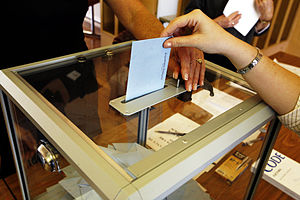Imagine a bank that only makes home loans. What if it only lent where it was the first lender to be paid back? And only lent up to 70% of a property's non-bubble value? If it it always followed those criteria and only lent to people with good credit, the loans it makes are very likely to be repaid.
Where the borrower gets the rest of the funds shouldn't matter to a bank that doesn't lend too much and is always paid back first. Such a bank could profitably charge less interest than banks lending the higher risk part of the financing.
So why can't we have such banks for those that want to have a safe place to deposit their funds? Why do we need the government to insure banks in order to provide a very safe banking option?
I don't think we need government insurance. All we need are banks that are restricted to this very safe kind of mortgage loan. Those that want safety can put their money in this kind of bank.
And those who want greater return can go to other banks that make riskier loans and where your deposits are at risk if the bank fails. And government funds would not bail out this kind of bank or its depositors, just as it does not bail out people who invest in the stock market.
And if either kind of bank fails, the owners of the bank should lose their investment. But the depositors don't have to lose their deposits. The bank's loans and their collateral could be turned over to a new, publicly-traded corporation owned by the depositors, who could either sell or hold their shares in that new entity.
There's no need for a bank failure to cause depositors to lose all their money. The collateral, the assets the loans were used to buy, still exist. But the bank can no longer pay its depositors their money on demand, so let it cease to be a bank.
There's no reason to enable unsuccessful bankers to continue to operate. There's no need to spend billions of taxpayer dollars.
Where the borrower gets the rest of the funds shouldn't matter to a bank that doesn't lend too much and is always paid back first. Such a bank could profitably charge less interest than banks lending the higher risk part of the financing.
So why can't we have such banks for those that want to have a safe place to deposit their funds? Why do we need the government to insure banks in order to provide a very safe banking option?
I don't think we need government insurance. All we need are banks that are restricted to this very safe kind of mortgage loan. Those that want safety can put their money in this kind of bank.
And those who want greater return can go to other banks that make riskier loans and where your deposits are at risk if the bank fails. And government funds would not bail out this kind of bank or its depositors, just as it does not bail out people who invest in the stock market.
And if either kind of bank fails, the owners of the bank should lose their investment. But the depositors don't have to lose their deposits. The bank's loans and their collateral could be turned over to a new, publicly-traded corporation owned by the depositors, who could either sell or hold their shares in that new entity.
There's no need for a bank failure to cause depositors to lose all their money. The collateral, the assets the loans were used to buy, still exist. But the bank can no longer pay its depositors their money on demand, so let it cease to be a bank.
There's no reason to enable unsuccessful bankers to continue to operate. There's no need to spend billions of taxpayer dollars.










